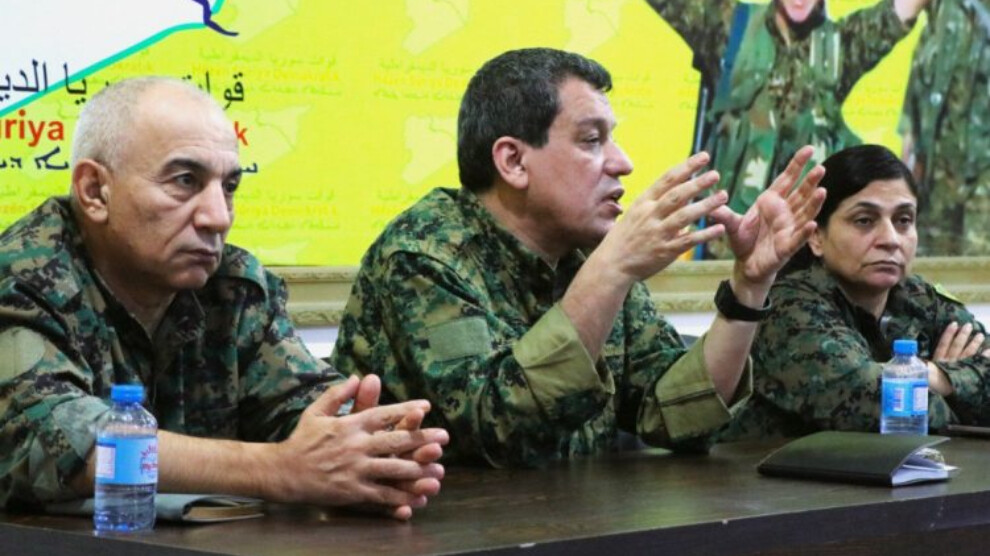SDF General Command holds a meeting with Raqqa Military Council and Euphrates Region Command
The meeting provided a comprehensive overview of the regional political and military landscape in the North-East Syrian regions.
The meeting provided a comprehensive overview of the regional political and military landscape in the North-East Syrian regions.

As part of its regular meetings, the SDF (Syrian Democratic Forces) General Command convened a meeting with the Euphrates Region Command and the Raqqa Military Council.
The SDF Commander-in-Chief Mazloum Abdi, accompanied by General Command members Suzdar Derik and Chiya Kobani, presided over the meeting. Abdi initiated the discussion by providing a comprehensive overview of the regional political and military landscape. He highlighted the significant political, military, and economic challenges confronting the North and Eastern Syria Region, particularly due to the escalating aggression and hostile attacks perpetrated by the Turkish occupying state against the local population and their property.
The General Command deliberated on effective strategies to counter these attacks and ensure the ongoing security and stability of the region and its populace. A significant portion of the meeting was dedicated to a comprehensive discussion between the leadership and attendees regarding the ongoing war against the remnants of ISIS. The Command emphasized the necessity of intensifying security and military operations to eliminate ISIS terrorists who continue to perpetrate terrorist acts against both SDF forces and civilians. These attacks aim to undermine security, destabilize the region, and spread terrorism, while also thwarting the regime’s plans and its cells to incite sedition. The SDF General Command reviewed the overall military and organizational activities of the Euphrates Region and the Raqqa Military Council.
Additionally, they evaluated the preparedness and military readiness of SDF forces, particularly in the Euphrates Region and Raqqa Military Council, to counter any potential attacks from the Turkish occupying state or other parties targeting the North and Eastern Syria Region. The effectiveness of military coordination between the various military councils and security institutions in Raqqa was also assessed.
The SDF General Command also evaluated the shortcomings and deficiencies in the performance of the regional leadership and the Raqqa Military Council. They urged these entities to enhance the effectiveness of the councils and their offices, emphasizing the importance of ongoing fighter training through intensive and professional courses. Furthermore, the General Command called upon the leadership to overcome the challenges associated with adopting scientific and organizational approaches. “By developing these skills and experience, the leadership can contribute to achieving a higher level of organizational discipline and adherence to our forces’ internal rules and regulations,” said the SDF General Command, instructing the Raqqa Military Council to intensify its efforts against ISIS cells and other hostile parties.
Additionally, they were directed to support the Internal Security Forces in enhancing security, preventing tribal conflicts, and facilitating their swift resolution. The council was also tasked with maintaining continuous and rigorous follow-up of drug-related issues and pursuing those involved. In response, the Euphrates Regional Command and the Raqqa Military Council presented reports detailing their military and organizational activities during the previous period to the General Command. They highlighted the preparedness of their forces to confront any potential aggression or attacks on the North and Eastern Syria Region.
Furthermore, they reviewed their action plans for effectively organizing and training military forces and intensifying communication with the local population by providing updates on the region’s most significant political and military developments. The council leaders pledged to strengthen the frontlines, respond to all violations and aggressions perpetrated by the Turkish occupation in the Tal Abyad and Ain Issa regions, and pursue those attempting to undermine the security and stability of the region.